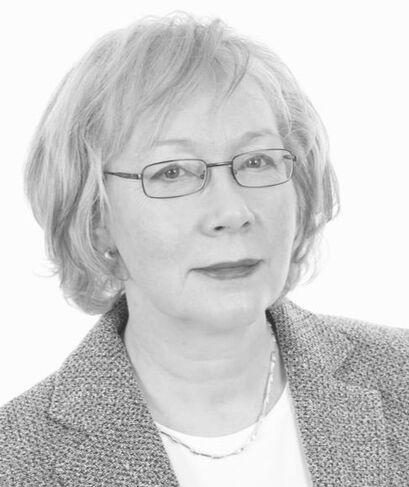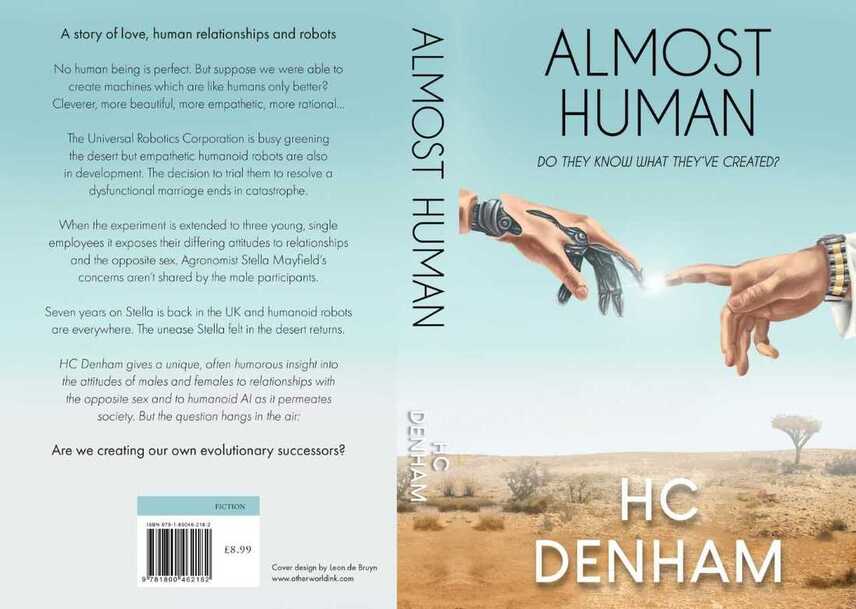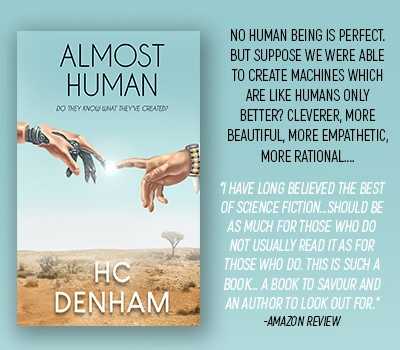
It's with great pleasure that I welcome H. C. Denham onto the website today. Of her science fiction debut, Almost Human, one reviewer wrote the following: 'A book to savour and an author to look out for.'
Alex: Tell me a bit about yourself.
H.C. Denham: I grew up happily in Worcestershire, the only child of a college lecturer and stay and home (but quietly powerful) mother but, after studying History at Oxford never went back to live there. So now I'm a Londoner through and through.
After casting around and trying out teaching and local government I ended up as a lawyer. Accidental meetings and opportunities took me into senior corporate roles and directorships in pubs, recruitments and tech but I always had a sneaking feeling that I'd missed my true vocation. I love writing - even letters of complaint or dry technical documents. I also work best to deadlines and under pressure. I should probably have been a journalist.
My only completed novel, Almost Human published at the beginning of 2020, started as a short story. I began thinking of the implications of the development of humanoid robots and the idea of being able to create a perfect partner. I was in a writer's group at the time with three other published authors who told me that the story "had legs" so I took it forward and over a period of about three years it developed into an examination of how the development of this technology and its integration into our lives might affect us all.
Alex: Tell me a bit about yourself.
H.C. Denham: I grew up happily in Worcestershire, the only child of a college lecturer and stay and home (but quietly powerful) mother but, after studying History at Oxford never went back to live there. So now I'm a Londoner through and through.
After casting around and trying out teaching and local government I ended up as a lawyer. Accidental meetings and opportunities took me into senior corporate roles and directorships in pubs, recruitments and tech but I always had a sneaking feeling that I'd missed my true vocation. I love writing - even letters of complaint or dry technical documents. I also work best to deadlines and under pressure. I should probably have been a journalist.
My only completed novel, Almost Human published at the beginning of 2020, started as a short story. I began thinking of the implications of the development of humanoid robots and the idea of being able to create a perfect partner. I was in a writer's group at the time with three other published authors who told me that the story "had legs" so I took it forward and over a period of about three years it developed into an examination of how the development of this technology and its integration into our lives might affect us all.

Alex: How would you describe your writing, and are there particular themes that you like to explore?
H. C. Denham: When I started writing I used to read back what I had written and feel uncomfortable. It seemed over-elaborate - too "literary". I think I have got over this. I aim for simplicity - and am quite sparing of literary devices - metaphor, simile etc. Usually one adjective is enough. I do like a lacing of humour. I'm interested in people - whether it's our near or remote ancestors or the populations of the future. So that's the subject and the possible settings are myriad.
Because I am a fundamentally lazy person, while working full time I did little writing. I started working on a number of ideas - a murder mystery set in the Inns of court, a historical novel set in the so called Dark Ages at the time of the disintegration of Roman Britain. The Lady Magazine published two short stories of mine, both with contemporary settings, focusing on brief encounters between two people and the emotions aroused.
Alex: Are you a writer that plans a detailed synopsis or do you set out with a vague idea and let the story unfold as you write?
H. C. Denham: I have never done a detailed plan. My only published novel grew organically from the original idea. My short stories are less random. I know where they will end when I start, albeit not necessarily all the steps to getting there. If I take one of my embryonic novels forward I will probably attempt to plan more in advance but one of the most enjoyable aspects of writing is seeing where it will take you (in my opinion).
H. C. Denham: When I started writing I used to read back what I had written and feel uncomfortable. It seemed over-elaborate - too "literary". I think I have got over this. I aim for simplicity - and am quite sparing of literary devices - metaphor, simile etc. Usually one adjective is enough. I do like a lacing of humour. I'm interested in people - whether it's our near or remote ancestors or the populations of the future. So that's the subject and the possible settings are myriad.
Because I am a fundamentally lazy person, while working full time I did little writing. I started working on a number of ideas - a murder mystery set in the Inns of court, a historical novel set in the so called Dark Ages at the time of the disintegration of Roman Britain. The Lady Magazine published two short stories of mine, both with contemporary settings, focusing on brief encounters between two people and the emotions aroused.
Alex: Are you a writer that plans a detailed synopsis or do you set out with a vague idea and let the story unfold as you write?
H. C. Denham: I have never done a detailed plan. My only published novel grew organically from the original idea. My short stories are less random. I know where they will end when I start, albeit not necessarily all the steps to getting there. If I take one of my embryonic novels forward I will probably attempt to plan more in advance but one of the most enjoyable aspects of writing is seeing where it will take you (in my opinion).

Alex: What was the first book you read?
H. C. Denham: I was a voracious reader and used to sit at table eating with a book propped up in front of me. What tolerant parents! I definitely read Little Women, What Katy Did, The Wind in the Willows, The Jungle Book and the historical novels of Rosemary Sutcliffe and Mary Renault among many others while at primary school. However, I was completely knocked out when my English teacher in the first year of secondary school lent me The Hobbit. The Lord of the Rings trilogy followed and consumed my imagination. I can't remember when I read the works of Isaac Asimov and Ray Bradbury but they also made a big impact. I think I'm relatively unusual among women in liking and wanting to write science fiction.
Alex: How much research do you do and what does it usually entail?
H. C. Denham: I did little research for Almost Human as I wrote almost exclusively about things and places I knew. I did research restaurants in Nairobi online as I had not been to one when I was there. However, after the book was published I sent a copy to Stuart Russell, top AI scientist, giver of the 2021 Reith Lectures and himself the author of Human Compatible: AI and the Problem of Control, saying that if I had read his book first mine might have been slightly different and more technical. He did read mine and we had an online discussion about a promising idea for a sequel in which my legal background would be useful. He was kind enough to say I had got some things right in Almost Human. For the next one I will need to do more research into the relevant science and law.
Alex: Do you ever base your characters on people you have encountered in real life?
H. C. Denham: Most of the characters in my writing have at least echoes of people I know or have met.
Alex: Which was the last book you read that blew you away?
H. C. Denham: It is quite rare for a book to blow me away these days. I may enjoy it but it's never been the same as the experience of reading Pride and Prejudice for the first time when I was fourteen or the novels of Trollope. I did stay up all night to finish Michael Crichton's Jurassic Park in one sitting and also Mark Haddon's The Curious Incident of the Dog in the Night-time.
Alex: How do you market your books?
H. C. Denham: I have not been good at this. My publisher introduced the novels to some reading blogs and other publications and I have been taken up on recommendation by some book groups. I had one book signing during a lull in the lockdowns and I have a website which I have neglected. My sales have been reasonably encouraging in view of the fact I didn't have a big publisher behind me. I have ideas for future marketing as I now have more time (and a son in the business!). I am advised that the novel would translate well into a film or TV series and am looking into it.
Alex: What are your interests aside from writing? And what do you do to unwind?
H. C. Denham: I have always been fascinated by History and architecture. I read more books of History than novels these days although I do belong to the Caledonian Society book club. I sing in a choir and love classical choral music, prefer film to live theatre and have membership of many of the museums and art galleries so accessible to lucky Londoners. I am also extremely sociable. Love a good party - or a just a long chat or discussion over good food and wine.
Alex: Which authors do you particularly admire and why?
H. C. Denham: Jane Austen is top for me - particularly Pride and Prejudice for her clear and luminous prose, gentle humour and humanity and the perfect structure of her novels such as Pride and Prejudice. I love Trollope for his wonderful stories and insight into C19th society, Raymond Chandler for his brilliant and original prose, humour and plotting, Kingsley Amis for his humour (and the best ghost story I've ever read The Green Man), Tom Wolfe's The Bonfire of the Vanities and Raymond Bradbury's The History Man for satire and many more. Nowadays I am less likely to read a 'literary' novel, more likely to take up and enjoy a detective novel by someone like Anne Cleeves or a History Book, biography or something like the diaries of Chips Channon.
Alex: Thank you so much for sharing this with us. I look forward to reading Almost Human.
H. C. Denham: I was a voracious reader and used to sit at table eating with a book propped up in front of me. What tolerant parents! I definitely read Little Women, What Katy Did, The Wind in the Willows, The Jungle Book and the historical novels of Rosemary Sutcliffe and Mary Renault among many others while at primary school. However, I was completely knocked out when my English teacher in the first year of secondary school lent me The Hobbit. The Lord of the Rings trilogy followed and consumed my imagination. I can't remember when I read the works of Isaac Asimov and Ray Bradbury but they also made a big impact. I think I'm relatively unusual among women in liking and wanting to write science fiction.
Alex: How much research do you do and what does it usually entail?
H. C. Denham: I did little research for Almost Human as I wrote almost exclusively about things and places I knew. I did research restaurants in Nairobi online as I had not been to one when I was there. However, after the book was published I sent a copy to Stuart Russell, top AI scientist, giver of the 2021 Reith Lectures and himself the author of Human Compatible: AI and the Problem of Control, saying that if I had read his book first mine might have been slightly different and more technical. He did read mine and we had an online discussion about a promising idea for a sequel in which my legal background would be useful. He was kind enough to say I had got some things right in Almost Human. For the next one I will need to do more research into the relevant science and law.
Alex: Do you ever base your characters on people you have encountered in real life?
H. C. Denham: Most of the characters in my writing have at least echoes of people I know or have met.
Alex: Which was the last book you read that blew you away?
H. C. Denham: It is quite rare for a book to blow me away these days. I may enjoy it but it's never been the same as the experience of reading Pride and Prejudice for the first time when I was fourteen or the novels of Trollope. I did stay up all night to finish Michael Crichton's Jurassic Park in one sitting and also Mark Haddon's The Curious Incident of the Dog in the Night-time.
Alex: How do you market your books?
H. C. Denham: I have not been good at this. My publisher introduced the novels to some reading blogs and other publications and I have been taken up on recommendation by some book groups. I had one book signing during a lull in the lockdowns and I have a website which I have neglected. My sales have been reasonably encouraging in view of the fact I didn't have a big publisher behind me. I have ideas for future marketing as I now have more time (and a son in the business!). I am advised that the novel would translate well into a film or TV series and am looking into it.
Alex: What are your interests aside from writing? And what do you do to unwind?
H. C. Denham: I have always been fascinated by History and architecture. I read more books of History than novels these days although I do belong to the Caledonian Society book club. I sing in a choir and love classical choral music, prefer film to live theatre and have membership of many of the museums and art galleries so accessible to lucky Londoners. I am also extremely sociable. Love a good party - or a just a long chat or discussion over good food and wine.
Alex: Which authors do you particularly admire and why?
H. C. Denham: Jane Austen is top for me - particularly Pride and Prejudice for her clear and luminous prose, gentle humour and humanity and the perfect structure of her novels such as Pride and Prejudice. I love Trollope for his wonderful stories and insight into C19th society, Raymond Chandler for his brilliant and original prose, humour and plotting, Kingsley Amis for his humour (and the best ghost story I've ever read The Green Man), Tom Wolfe's The Bonfire of the Vanities and Raymond Bradbury's The History Man for satire and many more. Nowadays I am less likely to read a 'literary' novel, more likely to take up and enjoy a detective novel by someone like Anne Cleeves or a History Book, biography or something like the diaries of Chips Channon.
Alex: Thank you so much for sharing this with us. I look forward to reading Almost Human.
